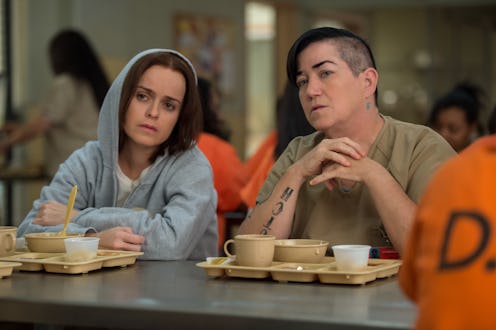Entertainment
The Netflix Shows We Marathon Have This In Common

This just in: Netlix knows which shows you're obsessed with. In fact, the shows watched most on Netflix have been organized into a graphic incorporating even more awesome information. According to the press release, there are statistics proving that there are shows audiences savour (slowly and at intervals, like a fine wine or rich Belgian truffles) and other shows audiences devour (like a bag of hot salted popcorn snout-first at the latest Marvel movie). The fascinating thing is how coherent the list is, but neither the list nor the graphic point out the one key factor uniting the shows that you guys can't turn off.
First, the list. Those in the "savour" side of the graphic include "irreverent comedies" like Bojack Horseman or Arrested Development; "political dramas" like House of Cards; "historical dramas" like Mad Men; "superhero dramas" like Daredevil. "Crime dramas" e.g. Bloodline and "Dramatic Comedies" like Orange is The New Black flank the center of the graphic. Towards the oblivion side include "Action & Adventure" e.g. Marco Polo; "Sci-fi" e.g. Sense8 and right at the top end of marathoning are "Horror"(Scream, The Walking Dead, American Horror Story) and "Thriller" (Bates Motel, Breaking Bad, Dexter, Sons of Anarchy).
So have you guessed what the deciding characteristic is? The one key theme that decides whether you'll press play on the next episode or actually leave your apartment for the first time in days to go make contact with those organisms known as human beings? I have just one word for you: stress.
Look, obviously, watching House of Cards is not a walk in the park. It's stressful. But it's stressful in a completely different way than watching, say, The Walking Dead. House of Cards generally has one key storyline per season (think: Season 1, Underwood going for the role of vice president, Season 2, Underwood undermining the president to steal his job, etc.), meaning it's a slowburn sort of stress where there's a growing sense of dread, but it's not all at once.
This poses a stark contrast with a show like The Walking Dead, which has the sort of plot-heavy twists and turns that means that cliffhangers are thrown up not just most episodes, but at different points in individual episodes. One example is in Season 6, episode 1 "First Time Again," which opens on the quarry filled with walkers, progresses to show a truck falling over from where it was blocking an exit route leading to Alexandria meaning the group's plunged into emergency mode, trying to stop the walkers getting there first and continues to show Pete's son Ron almost becoming lunch for some walkers... I could go on because there's way more stressful plot points to cover, but you get the picture.
I would argue that these shows that pummel the viewer with one stressful scene after another (Dexter, The Walking Dead, Breaking Bad) induce marathon watching because we can't get them out of our head when one episode comes to a close. The only way we can get any real peace once we've started these shows and they've wormed their way into our imaginations is to watch them to their conclusion so they can't haunt our nightmares. Even if the show ends unhappily, at least it's unhappily ever after, right?
So, the next time you consider starting a new show, it's worth considering two things: do you want to spend your summer more or less surgically attached to your laptop screen? If the answer's no, you know what sort of shows to pick. Comedies will keep you laughing, but won't keep you chained to your sofa. But hey — when winter rolls around and you want an excuse to never go outside again, you know what to do.
Images: Netflix (2); AMC